 Remembering the heroic witnesses of the faith
Remembering the heroic witnesses of the faith
Interview with Pavlo Vyshkovskyy, OMI
Fr. Pavlo Vyschkovskyy spent the months of October to December, 2005, in Rome in follow a course organized by the Pontifical Council for Communications for those responsible for diocesan communications offices. He took the opportunity, while in Rome, to defend his doctoral thesis in spirituality on October 24 at the Teresianum. This thesis was also the completion of his licentiate, obtained in 2003. Pavlo, from a Latin Catholic family, first met the Oblates when they went to Ukraine at the end of the 80’s. He made his first vows on September 8, 1993. He studied at the scholasticate in Obra in Poland and was ordained on July 10, 1999. He is the first Ukrainian Oblate.
- Pavlo, could you simply remind us of a few important details of your life?
I was born on May 7, 1975, at Bar in the east-central part of Ukraine. I am the first of three sons. My father, now retired, was a driver in a farm co-op and my mother worked in a factory in the village. Under the communists, we no longer had a parish church, so we had to go to Mass at a church five kilometres away. My parents always took me with them, even though it was forbidden to take children under the age of 18 to church. Teachers stood in front of the church to keep the children from entering. Sometimes my parents hid me under a coat or dressed me as a young girl to trick them. Once I was in the middle of a “tug-o-war” between my parents and the teachers. In church, when it was necessary, they hid me under the pews. I will always remember my First Communion, in the secret of the night, by candlelight. There was no electricity in the church because, according to the Soviet government, electricity was invented by Lenin and one should not “disgrace” the light by putting it in a church!
- And here you are, thirty years later, come to defend your doctoral thesis in spirituality at the Pontifical Institute “Teresianum” of the Carmelite Fathers of Rome. Can you tell us something about that?
The title of the thesis explains well the content: “The Witness of the Faith in the Roman Catholic Church in Ukraine during the Communist Persecution (1917-1991).” I wrote the thesis in Italian and included letters and photos. What is original about it is that it deals with the Roman Catholic Church about which there has been practically no research, at least in Western Europe. In it, I focus on the historical context of the communist years, and then I go on to look at the witness of bishops, priests, men and women religious, and laity during that period.
- Your thesis is the continuation of a previous work, isn’t it?
Yes. In 1998, I published some research on the communist persecution, but I concentrated solely on my parish in Bar.
- So it’s nearly 10 years that you have been working on this subject. I see that it’s something close to your heart. What motivates you in this research?
Simply to let people know what really happened. Public opinion totally ignores what took place. As a sub-title of my work, I quoted John Paul II: Remembering the heroic witnesses to the faith in the 20th century means preparing the future … The new generations must know the cost of the faith they have inherited …” (Angelus of May 7, 2000) Who knows, for example, that a member of my family was buried alive simply because he was saying the rosary? In 1937, people from my village learned that they were destroying churches in Russia. So that this would not happen to us, they took turns for two months defending the church. When “the others” arrived with their big weapons, the people threw themselves under the wheels. Incredible things happened then. For example, a dozen people had their heads pierced by wire running from one ear to the other and this “rosary” was hung on the church.
Three hundred and sixty families from my village, near Bar, were deported to Siberia and only one has returned just recently. And the others? According to the archives, 9,439 persons from my parish were killed out of hatred of the faith. And no one knew a thing about it. They had to be reminded.
- You were able to consult the archives?
Yes, I was in 17 archives, some of them secret…I had friends who got me a pass. But you cannot find everything in the archives since Khrushchev, already in 1957, destroyed a lot of material. So I went to meet and question several living witnesses who described what they had lived. That was the most exciting thing. For example, I went to Solovki Camp in Siberia and that was an adventure in itself. I had to go by plane to Moscow and then take another plane to Archangelsk on the White Sea. From there, it took 24 hours by train to Murmansk, and the train runs only once a week. In that camp, there were a million prisoners and about 20,000 deaths. I was able to speak with people who still live in that area. I found the archives in Moscow. I even tried to get into Lubianka, that terrible political prison where Catholic priests were tortured in the electric chair, but I was stopped when it tried sneak in.
- So, you already had a lot of material. How does your thesis bring it all together?
I had begun to gather material in 1995. There was a certain air of freedom, so I was able to consult top-secret archives. That’s no longer possible today. In my thesis, I wanted to do for the whole of Ukraine what I had done for my own parish.
- Why?
Because when I arrived in Rome, someone said to me, “You converted to Catholicism in order to join the Oblates…” They did not know that there are Roman Catholics in Ukraine. The situation of Ukraine is not well-known. I wanted to change that. There are about two million Latin Catholics, and with the Greek Catholics, together they represent 17% of the population.
- That’s already a significant reality…
Before 1917, there were five million Latin Catholics. By 1937, officially there were no Catholics and no priests. Therefore, in 20 years, five million simply disappeared. The tsars had already persecuted the Catholics… these foreigners: Polish, Lithuanians, Estonians, Germans … who maintain a relationship with the foreigner (Rome)… they are dangerous people and always suspected of being enemies of the State. Actually, it was during the last war that the situation changed for us, because foreigners arrived; they re-opened the churches, and the Catholics came out of hiding. It’s understandable therefore that the Catholic Church never had much influence. On the part of the Orthodox, there was a pseudo-synod in 1936 which, in effect, submitted the Church to government control, so much so that the Orthodox leaders were often allied with the government… but not all of them. Some of them also resisted and they too had their martyrs.
- And today? Everyone followed what they called the “Orange Revolution.” Tell us about that adventure.
The Orange Revolution grew from the hope of people who felt pressured by the regime and who wanted to go out and cry out their thirst for truth, freedom, and independence. The widespread movement came about after a manipulation of the elections. It was also pushed by those who wanted to belong to Europe.
- Were you on Independence Square during these events?
During the 17 days of the revolution, we went with the prenovices to bring warm clothing, tea, and food to the people who were staying on the square day and night. All the Oblates took part in the events, either on the square in Kiev or in other towns. They were with the people. For us, it was a hope. The Church hoped that finally we would have more freedom.
- And today?
That’s not easy to answer so soon. There remains a lot to be hoped for. We were hoping, for example, that the church of St. Nicholas in Kiev would finally be given back to us, but nothing has changed and the answers of this government are practically the same as those of the former one.
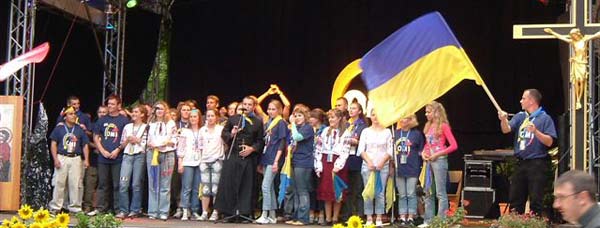
Youth from Ukraine and Turkmenistan at WYD In Cologne.
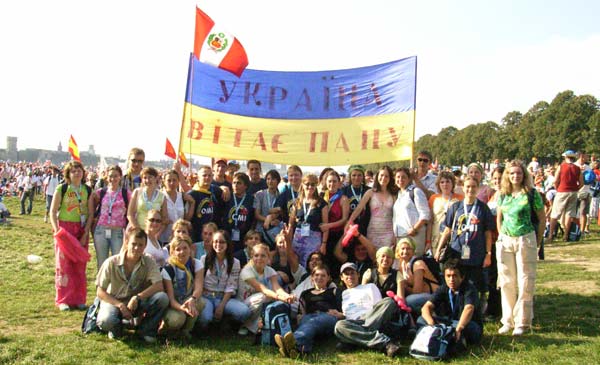
But there is a strong desire to move toward the West. Life is more peaceful; we are no longer harassed by the police. The president swore on the square that everyone would have the right to pray in his own church; there is hope. Freedom is costly, but there is that hope.
- And how do the people live?
They have a lot of hope. But wages have stayed almost the same while prices have gone up. Seeing that we were distancing ourselves from them, Russia cut off our gasoline and natural gas. Later, the gasoline and natural gas came back, but at a much higher price! Freedom is costly, but now everyone knows that Ukraine exists. And now there are more and more Western investments; so there is hope.
On the anniversary of the Orange Revolution, there were 900,000 people in Independence Square in Kiev. That shows that we are moving in the right direction. We need to move forward on our own. People are disappointed because they were expecting almost magical changes. Although it’s up to us to create our own history, the West must not leave us alone. During the 17 days of the occupation of the square, the people felt united; they attained a sort of common awareness. It was also on the square that there was born the idea of inter-religious dialogue, because for the first time, we prayed together. And now, on the 13 th of every month, thousands of people gather around Saint Sophie – which is still a museum, although it is the oldest church in Ukraine – from all faiths, to live, to pray, to hope together.
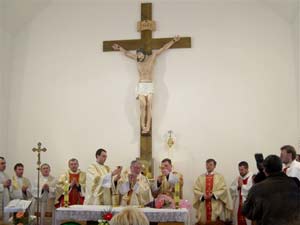
The blessing of the Chapel at Poltawa in 2004
- Is there any significant thing that, as far as you are concerned, shows a real change?
Immediately after his election, President Youtchenko wanted all the religious leaders to come to Saint Sophie to pray for the new country. He himself came and knelt before the altar. When I saw that, I was absolutely shocked. Think about it. When I was little, I had to kneel before the presidents and now, he is on his knees before God in the church. It was like an explosion, like a bomb… I cried like a baby.
- And what are you doing in Ukraine?
I am a missionary. Mission means involvement in the Congregation and in the world to help everyone know Christ. For the Oblates, I am in charge of the prenovitiate. We have four prenovices: two Ukrainians and two from Turkmenistan, of Russian origin. The novitiate lasts for two years because we must give these youth the fundamentals which were greatly lacking in their families. With me there is Diego, a Spanish Oblate who learned Russian and came to Ukraine for his regency. Then he received his obedience for the delegation. He helps me a lot.
- Have you also a responsibility in service of the Church?
Yes, since last March 7, I am the Director of Media and Communications for the Roman Catholic Church in Ukraine. When the Bishops’ Conference asked for an Oblate for this position, our Delegation Superior told them that all of us were already overworked. But they insisted. “Give us any Oblate; he will surely do a good job!” All the while, there are 26 male Congregations in Ukraine.
- And do you feel at home, as an Oblate in that work?
In the review of our ministry tied to the Immense Hope Project, we all felt the need to be involved with the media. This appointment makes that desire more concrete. And it is a very important work for today’s world. Until now, the Church’s image was that of the Church of the catacombs which came out occasionally to wave its flag and then to disappear again. The Communications Centre is the first visible presence of the Catholic Church in our society.
The Catholic Church is greatly respected in our society. From time to time, there are as many as four different TV channels asking for interviews about the thought of the Church in the social sphere and in others. And they come to us. That is new, because in the past, the media were rather propaganda tools against us. It is significant that people still confess that they watched the news on television during Lent!
- You spoke of the Communications Centre. Can you tell us more?
There are five full-time employees who work at the Centre itself and thirty or so who collaborate with us across the country. We put out a full-colour magazine for children, printing up to 6,000 copies. We are a press office that sends out by e-mail everyday local and world-wide Church news to all radio and TV stations and newspapers. We make films, especially about the saints. We have a 20 minute radio program, broadcast each Sunday, on the official radio station and for which we pay 18,000 € for six months. It’s difficult to keep it up because of the price, but the German Oblates think it might be possible for us to find in parishes in Germany some computers that we could distribute at home so that people could follow on the Internet not only our little 20 minute program but all of our programs… for nothing…free! It’s exciting! At the Centre, there is a chapel where we pray for journalists. Once a month, there is an ecumenical meeting with journalists. Actually, it is they themselves who have asked for this collaboration.
The progress has been astonishing. On Christmas for the first time we will have a live broadcast of the pope’s Mass. There is a private TV station that has agreed to broadcast our programs in 27 former Soviet countries once a week.
- Tell us about the Oblates in Ukraine.
There are 35 of us, counting the scholastics. We have eight houses and about 20 parishes because that’s the greatest need after communism. We are in the northern part of Ukraine on the border with Byelorussia, where we take care of Chernobyl, or rather the town that replaced it, Slavutych. We are also in Tchernichiv where we have built the church and founded an orphanage that also feeds children from outside. In Kiev, we serve at the beautiful church of St. Nicholas which is still a hall for organ concerts and we have to rent it. Near Kiev, there is Obukhiv, headquarters of the delegation and of the prenovitiate. I don’t want to bore you with the names of places, but I would like to point out two interesting spots: Kryvyj Rih to the east, the longest city in Europe. It extends for 126 km along the ancient copper mines and Eupatoria in Crimea, a vacation spot on the North Sea. One of the Oblates has also specialized in preaching parish missions.
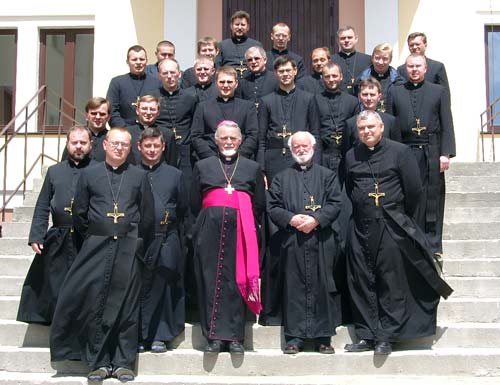
The Oblate Retreat in May, 2005, in Obuhiv
Our parishes are all in the founding phase; everything needs to be done. It is necessary to start at ground zero, including the level of education of the people. Once our superior, Fr. Jacek, picked up a woman who was hitch-hiking. They passed in front of a cross and the woman said, “Who is that? Is he one of yours?” Jacek answered, “Yes, that’s Jesus Christ.” And she replied, « Never heard of him… don’t know him. »
Everything remains to be done. We have already built five churches and restored another, the one in Gnievan, which had been incorporated into a factory. There are still five to be built. We are convinced that the greatest gift we can offer to God and to this land is sanctity. That will begin with the consecration of this land that has suffered so much and been so mistreated.
In our work, we are aware that we are being helped by many persons. We can do nothing by ourselves. Therefore we want give heartfelt thanks to the Congregation and all the people who help us.
Interview by Jean-Pierre CALOZ, OMI
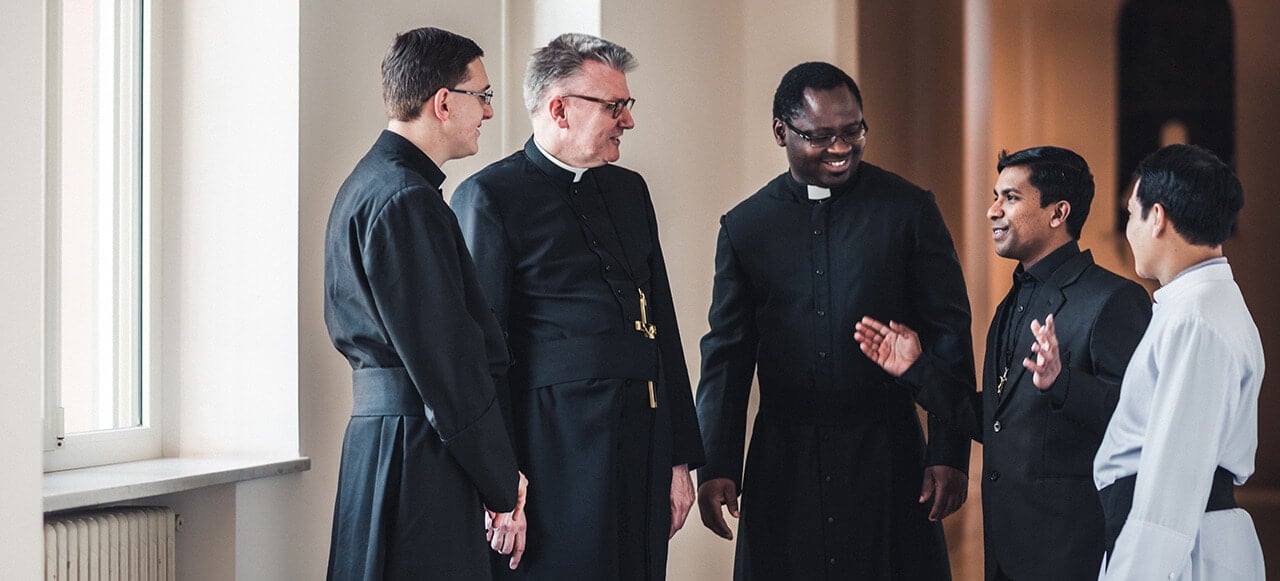
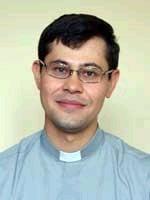 Remembering the heroic witnesses of the faith
Remembering the heroic witnesses of the faith